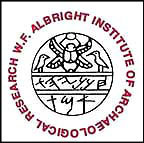 | |
| Type | Private research institute |
|---|---|
| Established | 1900 |
| Director | Dr. James Fraser |
Academic staff | 54 |
| Location | |
| Affiliations | American Schools of Oriental Research, Council of American Overseas Research Centers |
| Website | http://www.aiar.org/ |
The W. F. Albright Institute of Archaeological Research (AIAR) is an archaeological research institution located in East Jerusalem. It is the oldest American research center for ancient Near Eastern studies in the Middle East. Founded in 1900 as the American School of Oriental Research, it was renamed in 1970 after its most distinguished director and the father of biblical archaeology, William F. Albright.[1] Its mission is to develop and disseminate scholarly knowledge of the literature, history, and culture of the Near East, as well as the study of civilization from pre-history to the early Islamic period.
Today, the Albright Institute is one of three separately incorporated institutes affiliated with the American Schools of Oriental Research (ASOR), the others being the American Center of Oriental Research – ACOR in Amman, Jordan, and the Cyprus American Archaeological Research Institute – CAARI – in Nicosia, Cyprus.[2] In 1948, the then American School of Oriental Research, also known as the Jerusalem School, played a significant role in the discovery and identification of the Dead Sea Scrolls (see below). Between 1981 and 1996, the Albright Institute, together with the Institute of Archaeology, Hebrew University of Jerusalem, excavated at the ancient Philistine site of Tel Miqne-Ekron, one of the five Philistine capital cities mentioned in the Bible. With the appointment of the new director, Matthew J. Adams (2014), the institute is now engaged in the Jezreel Valley Regional Project, a long-term, multi-disciplinary survey and excavation project investigating the history of human activity in the Jezreel Valley from the Paleolithic through the Ottoman period.[3]
Located in a 1920s-period building, now a Jerusalem landmark, the Albright maintains residential and research facilities including a 35,000 volume library, publications offices, and archaeological laboratories.[4]